Unit 5 What were you doing when the rainstorm came? Section B 2b Reading课文知识点串讲课件15张
文档属性
| 名称 | Unit 5 What were you doing when the rainstorm came? Section B 2b Reading课文知识点串讲课件15张 | 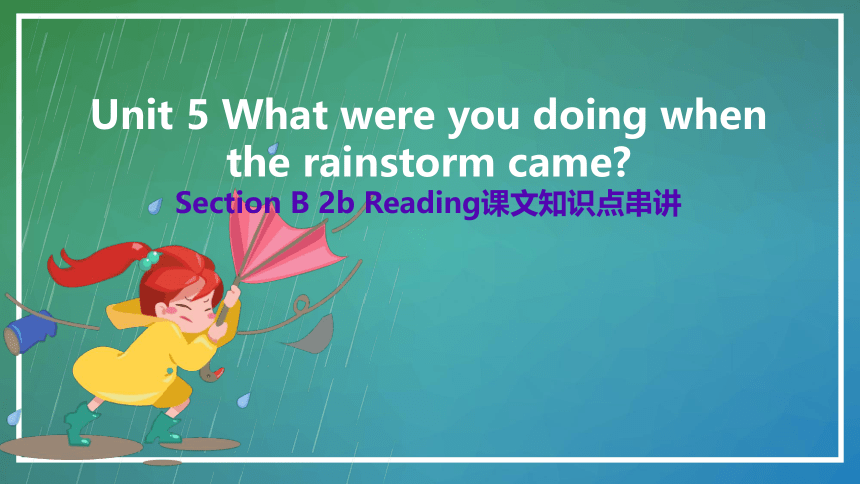 | |
| 格式 | pptx | ||
| 文件大小 | 1.2MB | ||
| 资源类型 | 教案 | ||
| 版本资源 | 人教新目标(Go for it)版 | ||
| 科目 | 英语 | ||
| 更新时间 | 2022-03-24 08:54:25 | ||
图片预览

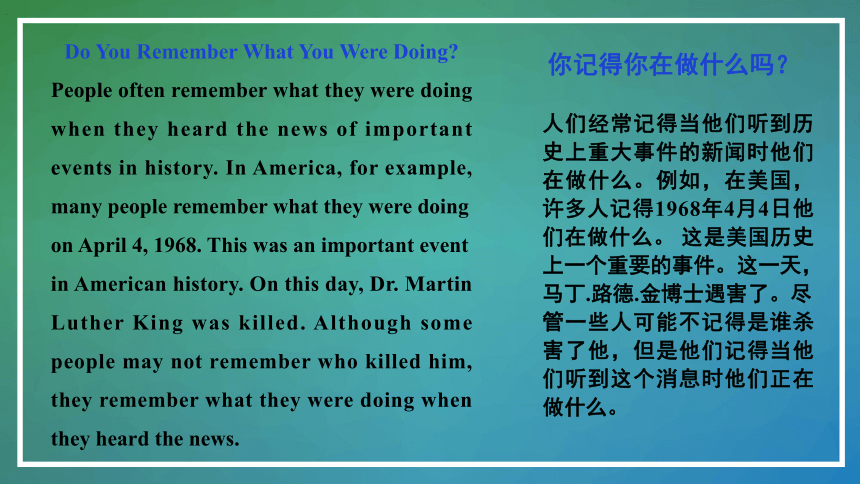
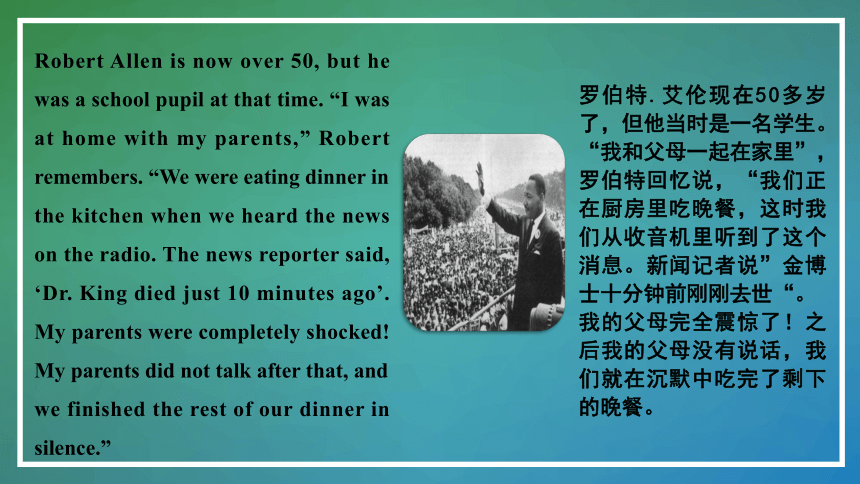
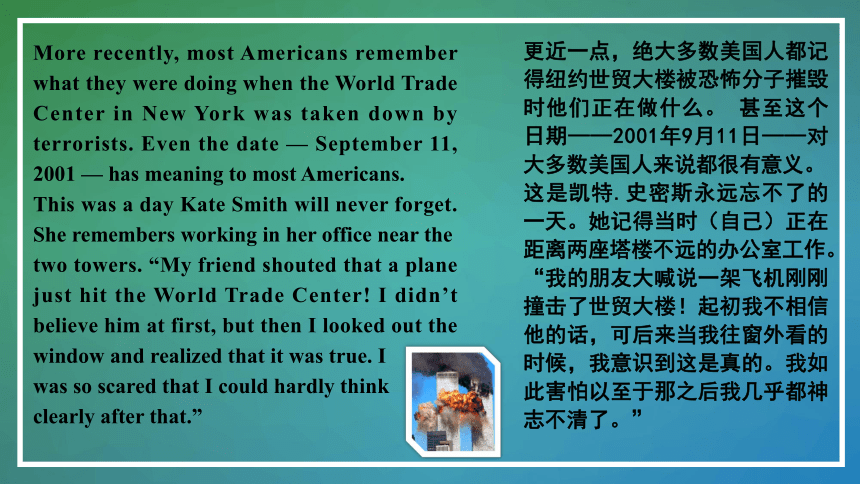
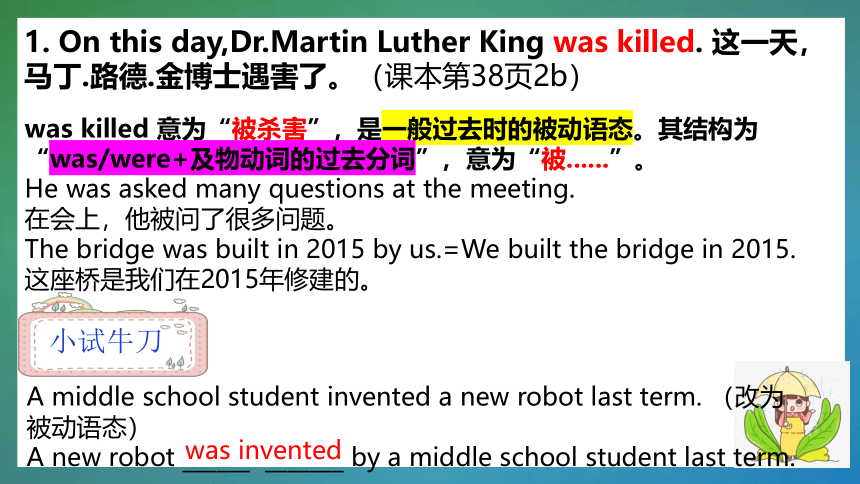
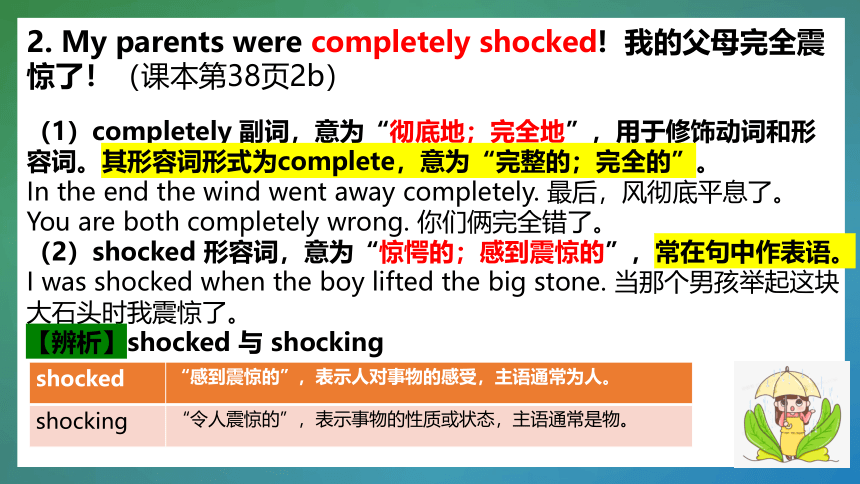
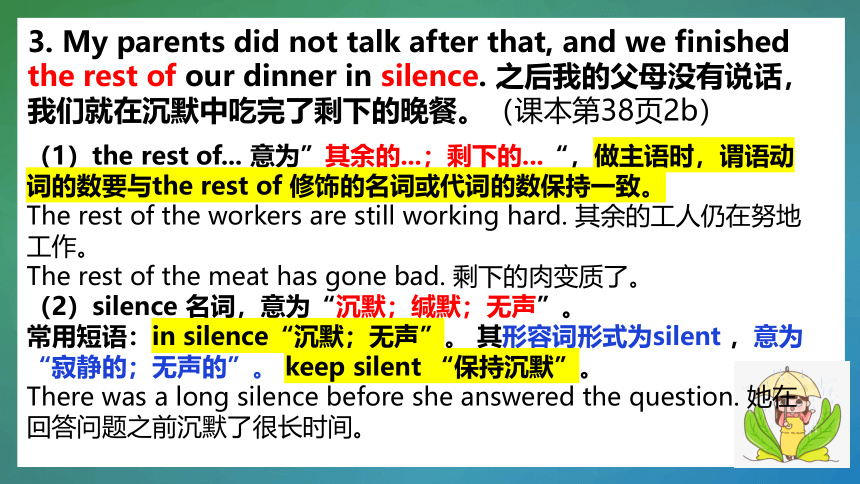
文档简介
(共15张PPT)
Unit 5 What were you doing when the rainstorm came
Section B 2b Reading课文知识点串讲
你记得你在做什么吗?
人们经常记得当他们听到历史上重大事件的新闻时他们在做什么。例如,在美国,许多人记得1968年4月4日他们在做什么。 这是美国历史上一个重要的事件。这一天,马丁.路德.金博士遇害了。尽 管一些人可能不记得是谁杀害了他,但是他们记得当他们听到这个消息时他们正在做什么。
Do You Remember What You Were Doing
People often remember what they were doing when they heard the news of important events in history. In America, for example, many people remember what they were doing on April 4, 1968. This was an important event in American history. On this day, Dr. Martin Luther King was killed. Although some people may not remember who killed him, they remember what they were doing when they heard the news.
罗伯特.艾伦现在50多岁了,但他当时是一名学生。 “我和父母一起在家里”,罗伯特回忆说,“我们正在厨房里吃晚餐,这时我们从收音机里听到了这个消息。新闻记者说”金博士十分钟前刚刚去世“。 我的父母完全震惊了!之后我的父母没有说话,我们就在沉默中吃完了剩下的晚餐。
Robert Allen is now over 50, but he was a school pupil at that time. “I was at home with my parents,” Robert remembers. “We were eating dinner in the kitchen when we heard the news on the radio. The news reporter said, ‘Dr. King died just 10 minutes ago’. My parents were completely shocked! My parents did not talk after that, and we finished the rest of our dinner in silence.”
更近一点,绝大多数美国人都记得纽约世贸大楼被恐怖分子摧毁时他们正在做什么。 甚至这个日期——2001年9月11日——对大多数美国人来说都很有意义。
这是凯特.史密斯永远忘不了的一天。她记得当时(自己)正在距离两座塔楼不远的办公室工作。“我的朋友大喊说一架飞机刚刚撞击了世贸大楼!起初我不相信他的话,可后来当我往窗外看的时候,我意识到这是真的。我如此害怕以至于那之后我几乎都神志不清了。”
More recently, most Americans remember what they were doing when the World Trade Center in New York was taken down by terrorists. Even the date — September 11, 2001 — has meaning to most Americans.
This was a day Kate Smith will never forget. She remembers working in her office near the two towers. “My friend shouted that a plane just hit the World Trade Center! I didn’t believe him at first, but then I looked out the window and realized that it was true. I
was so scared that I could hardly think
clearly after that.”
1. On this day,Dr.Martin Luther King was killed. 这一天,马丁.路德.金博士遇害了。(课本第38页2b)
was killed 意为“被杀害”,是一般过去时的被动语态。其结构为“was/were+及物动词的过去分词”,意为“被......”。
He was asked many questions at the meeting.
在会上,他被问了很多问题。
The bridge was built in 2015 by us.=We built the bridge in 2015.
这座桥是我们在2015年修建的。
小试牛刀
A middle school student invented a new robot last term. (改为被动语态)
A new robot ______ _______ by a middle school student last term.
was invented
2. My parents were completely shocked! 我的父母完全震惊了!(课本第38页2b)
(1)completely 副词,意为“彻底地;完全地”,用于修饰动词和形容词。其形容词形式为complete,意为“完整的;完全的”。
In the end the wind went away completely. 最后,风彻底平息了。
You are both completely wrong. 你们俩完全错了。
(2)shocked 形容词,意为“惊愕的;感到震惊的”,常在句中作表语。
I was shocked when the boy lifted the big stone. 当那个男孩举起这块大石头时我震惊了。
【辨析】shocked 与 shocking
shocked “感到震惊的”,表示人对事物的感受,主语通常为人。
shocking “令人震惊的”,表示事物的性质或状态,主语通常是物。
3. My parents did not talk after that, and we finished the rest of our dinner in silence. 之后我的父母没有说话,我们就在沉默中吃完了剩下的晚餐。(课本第38页2b)
(1)the rest of... 意为”其余的...;剩下的...“,做主语时,谓语动词的数要与the rest of 修饰的名词或代词的数保持一致。
The rest of the workers are still working hard. 其余的工人仍在努地工作。
The rest of the meat has gone bad. 剩下的肉变质了。
(2)silence 名词,意为“沉默;缄默;无声”。
常用短语:in silence“沉默;无声”。 其形容词形式为silent ,意为“寂静的;无声的”。 keep silent “保持沉默”。
There was a long silence before she answered the question. 她在回答问题之前沉默了很长时间。
4. More recently,most Americans remember that they were doing when the World Trade Center in New York was taken down by terrorists. 更近一点,绝大多数美国人都记得纽约世贸大楼被恐怖分子摧毁时他们正在做什么。(课本第38页2b)
(1)recently 副词,意为“不久前;最近”。常用于一般过去时和现在完成时的句子中。 recently 的比较级形式为more recently,意为“更近地”。
I heard the bad news only recently. 我只是最近才听到这个坏消息。
(2)take down 意为“拆除;推倒;取下;记下”,是“动词+副词”型短语,代词做宾语时放在take与down之间。
The bridge is dangerous,and the workers are taking it down. 这座桥很危险,工人们正在拆除它。
5. Even the date —September 11,2001—has meaning to most Americans. 甚至这个日期——2001年9月11日——对大多数美国人来说都很有意义。(课本第38页2b)
(1)date 名词,意为“日期;日子”,其前常加the,表示特指。
What’s the date of the next meeting 下次会议是几月几号?
【拓展】
★①询问具体日期的句型:What date is it today 或What’s the date today
★②询问星期几的句型:What day is it today
★③既询问日期又询问星期几的句型:What’s today
(2) meaning 名词,意为“意义;意思;含义”,常用搭配: have meaning to sb. “对某人有意义”。
The gift has specil meaning to me . 这个礼物对我有特别的意义。
6. She remembers working in her office near the two towers. 她记得当时(自己)正在距离两座塔楼不远的办公室工作。(课本第38页2b)
remember 动词,意为“记住;想起“,其后可接名词、代词、动词不定式、动词-ing形式或that从句做宾语。
Can you remember all the classmates’ names 你能记住所有同学的名字吗?
I don’t remember seeing the girl anywhere. 我不记得在什么地方见过这个女孩。
【辨析】remember doing sth. 与 remember to do sth.
remember doing sth. “记得做过某事”,动作已经发生。
remember to do sth. “记得要某事”,动作尚未发生。
7. Kate didn’t think her friend as telling the truth about the event. 凯特认为她的朋友没有说出那件事的真相。(课本第39页2c)
truth 名词,意为“事实;实情”。 常用短语: tell the truth 意为“说实话;讲事实“。
He didn’t tell the truth at this point.在这一点上他没讲真话。
【拓展】 true 形容词,意为“真的;真实的;可信的”,truly副词, 意为“真实地;确实地”。
Is it true that he has ledt London 他已经离开了伦敦,这是真的吗?
佳句欣赏
Seek the truth from the facts. 实事求是。
8. I had trouble thinking clearly after that because I was very afraid. 那之后我都难以清晰的思考,因为我很害怕。(课本第39页2d)
have trouble (in)doing sth. 表示“做某事有困难或麻烦”,相当于have difficulty/problems (in)doing sth.
I have trouble/difficulty/problems (in) working out the math problem. 我解这道数学题有困难。
【拓展】
trouble构成的其他短语搭配
由trouble 构成的常用搭配还有 get into trouble 陷入困境;遇到麻烦“; be in trouble ”处于困境之中“。
If you get into trouble,you can call me. 如果你遇到了麻烦,可以给我打电话。
Please call 110 when you are in trouble. 当你有困难时请拨打110。
9. But when I pointed it out to my friend,it went away. 可是当我指给我的朋友看时,它消失了。(课本第40页Self-check)
(1)point out 意为“指出”,是“动词+副词”型短语,代词做宾语时,应放point 和 out 之间。
There are several mistakes in the report. Can you point them out 这份报告中有几处错误,你能把它们指出来吗?
【拓展】
point 的词性以及含义:
①动词,指向
②名词,分数;观点
(2) go away 意为“离开;走开”。
He went away from his family yesterday. 昨天他离家出走了。
10. While my brother was laughing,the television news reported that other people had seen the light as well. 当我哥哥大笑时,电视新闻报道别人也看见了这束光。(课本第40页Self-check)
(1)had seen 为过去完成时结构,其构成为“had+动词的过去分词”,表示过去某个时间或动作之前就已经发生或完成的动作。
I realized that I had left my key in the room. 我意识到我把钥匙落在房间里了。
I had waited for you for 20 minutes before you came. 你来之前我已经等了你二十分钟了。
(2) as well 副词短语,意为“也”,相当于 too,常放在句末,通常用于肯定句或疑问句中。
Mike is learning French and Chinese as well. 迈克在学法语,也在学汉语。
Thank you for
watching~
Unit 5 What were you doing when the rainstorm came
Section B 2b Reading课文知识点串讲
你记得你在做什么吗?
人们经常记得当他们听到历史上重大事件的新闻时他们在做什么。例如,在美国,许多人记得1968年4月4日他们在做什么。 这是美国历史上一个重要的事件。这一天,马丁.路德.金博士遇害了。尽 管一些人可能不记得是谁杀害了他,但是他们记得当他们听到这个消息时他们正在做什么。
Do You Remember What You Were Doing
People often remember what they were doing when they heard the news of important events in history. In America, for example, many people remember what they were doing on April 4, 1968. This was an important event in American history. On this day, Dr. Martin Luther King was killed. Although some people may not remember who killed him, they remember what they were doing when they heard the news.
罗伯特.艾伦现在50多岁了,但他当时是一名学生。 “我和父母一起在家里”,罗伯特回忆说,“我们正在厨房里吃晚餐,这时我们从收音机里听到了这个消息。新闻记者说”金博士十分钟前刚刚去世“。 我的父母完全震惊了!之后我的父母没有说话,我们就在沉默中吃完了剩下的晚餐。
Robert Allen is now over 50, but he was a school pupil at that time. “I was at home with my parents,” Robert remembers. “We were eating dinner in the kitchen when we heard the news on the radio. The news reporter said, ‘Dr. King died just 10 minutes ago’. My parents were completely shocked! My parents did not talk after that, and we finished the rest of our dinner in silence.”
更近一点,绝大多数美国人都记得纽约世贸大楼被恐怖分子摧毁时他们正在做什么。 甚至这个日期——2001年9月11日——对大多数美国人来说都很有意义。
这是凯特.史密斯永远忘不了的一天。她记得当时(自己)正在距离两座塔楼不远的办公室工作。“我的朋友大喊说一架飞机刚刚撞击了世贸大楼!起初我不相信他的话,可后来当我往窗外看的时候,我意识到这是真的。我如此害怕以至于那之后我几乎都神志不清了。”
More recently, most Americans remember what they were doing when the World Trade Center in New York was taken down by terrorists. Even the date — September 11, 2001 — has meaning to most Americans.
This was a day Kate Smith will never forget. She remembers working in her office near the two towers. “My friend shouted that a plane just hit the World Trade Center! I didn’t believe him at first, but then I looked out the window and realized that it was true. I
was so scared that I could hardly think
clearly after that.”
1. On this day,Dr.Martin Luther King was killed. 这一天,马丁.路德.金博士遇害了。(课本第38页2b)
was killed 意为“被杀害”,是一般过去时的被动语态。其结构为“was/were+及物动词的过去分词”,意为“被......”。
He was asked many questions at the meeting.
在会上,他被问了很多问题。
The bridge was built in 2015 by us.=We built the bridge in 2015.
这座桥是我们在2015年修建的。
小试牛刀
A middle school student invented a new robot last term. (改为被动语态)
A new robot ______ _______ by a middle school student last term.
was invented
2. My parents were completely shocked! 我的父母完全震惊了!(课本第38页2b)
(1)completely 副词,意为“彻底地;完全地”,用于修饰动词和形容词。其形容词形式为complete,意为“完整的;完全的”。
In the end the wind went away completely. 最后,风彻底平息了。
You are both completely wrong. 你们俩完全错了。
(2)shocked 形容词,意为“惊愕的;感到震惊的”,常在句中作表语。
I was shocked when the boy lifted the big stone. 当那个男孩举起这块大石头时我震惊了。
【辨析】shocked 与 shocking
shocked “感到震惊的”,表示人对事物的感受,主语通常为人。
shocking “令人震惊的”,表示事物的性质或状态,主语通常是物。
3. My parents did not talk after that, and we finished the rest of our dinner in silence. 之后我的父母没有说话,我们就在沉默中吃完了剩下的晚餐。(课本第38页2b)
(1)the rest of... 意为”其余的...;剩下的...“,做主语时,谓语动词的数要与the rest of 修饰的名词或代词的数保持一致。
The rest of the workers are still working hard. 其余的工人仍在努地工作。
The rest of the meat has gone bad. 剩下的肉变质了。
(2)silence 名词,意为“沉默;缄默;无声”。
常用短语:in silence“沉默;无声”。 其形容词形式为silent ,意为“寂静的;无声的”。 keep silent “保持沉默”。
There was a long silence before she answered the question. 她在回答问题之前沉默了很长时间。
4. More recently,most Americans remember that they were doing when the World Trade Center in New York was taken down by terrorists. 更近一点,绝大多数美国人都记得纽约世贸大楼被恐怖分子摧毁时他们正在做什么。(课本第38页2b)
(1)recently 副词,意为“不久前;最近”。常用于一般过去时和现在完成时的句子中。 recently 的比较级形式为more recently,意为“更近地”。
I heard the bad news only recently. 我只是最近才听到这个坏消息。
(2)take down 意为“拆除;推倒;取下;记下”,是“动词+副词”型短语,代词做宾语时放在take与down之间。
The bridge is dangerous,and the workers are taking it down. 这座桥很危险,工人们正在拆除它。
5. Even the date —September 11,2001—has meaning to most Americans. 甚至这个日期——2001年9月11日——对大多数美国人来说都很有意义。(课本第38页2b)
(1)date 名词,意为“日期;日子”,其前常加the,表示特指。
What’s the date of the next meeting 下次会议是几月几号?
【拓展】
★①询问具体日期的句型:What date is it today 或What’s the date today
★②询问星期几的句型:What day is it today
★③既询问日期又询问星期几的句型:What’s today
(2) meaning 名词,意为“意义;意思;含义”,常用搭配: have meaning to sb. “对某人有意义”。
The gift has specil meaning to me . 这个礼物对我有特别的意义。
6. She remembers working in her office near the two towers. 她记得当时(自己)正在距离两座塔楼不远的办公室工作。(课本第38页2b)
remember 动词,意为“记住;想起“,其后可接名词、代词、动词不定式、动词-ing形式或that从句做宾语。
Can you remember all the classmates’ names 你能记住所有同学的名字吗?
I don’t remember seeing the girl anywhere. 我不记得在什么地方见过这个女孩。
【辨析】remember doing sth. 与 remember to do sth.
remember doing sth. “记得做过某事”,动作已经发生。
remember to do sth. “记得要某事”,动作尚未发生。
7. Kate didn’t think her friend as telling the truth about the event. 凯特认为她的朋友没有说出那件事的真相。(课本第39页2c)
truth 名词,意为“事实;实情”。 常用短语: tell the truth 意为“说实话;讲事实“。
He didn’t tell the truth at this point.在这一点上他没讲真话。
【拓展】 true 形容词,意为“真的;真实的;可信的”,truly副词, 意为“真实地;确实地”。
Is it true that he has ledt London 他已经离开了伦敦,这是真的吗?
佳句欣赏
Seek the truth from the facts. 实事求是。
8. I had trouble thinking clearly after that because I was very afraid. 那之后我都难以清晰的思考,因为我很害怕。(课本第39页2d)
have trouble (in)doing sth. 表示“做某事有困难或麻烦”,相当于have difficulty/problems (in)doing sth.
I have trouble/difficulty/problems (in) working out the math problem. 我解这道数学题有困难。
【拓展】
trouble构成的其他短语搭配
由trouble 构成的常用搭配还有 get into trouble 陷入困境;遇到麻烦“; be in trouble ”处于困境之中“。
If you get into trouble,you can call me. 如果你遇到了麻烦,可以给我打电话。
Please call 110 when you are in trouble. 当你有困难时请拨打110。
9. But when I pointed it out to my friend,it went away. 可是当我指给我的朋友看时,它消失了。(课本第40页Self-check)
(1)point out 意为“指出”,是“动词+副词”型短语,代词做宾语时,应放point 和 out 之间。
There are several mistakes in the report. Can you point them out 这份报告中有几处错误,你能把它们指出来吗?
【拓展】
point 的词性以及含义:
①动词,指向
②名词,分数;观点
(2) go away 意为“离开;走开”。
He went away from his family yesterday. 昨天他离家出走了。
10. While my brother was laughing,the television news reported that other people had seen the light as well. 当我哥哥大笑时,电视新闻报道别人也看见了这束光。(课本第40页Self-check)
(1)had seen 为过去完成时结构,其构成为“had+动词的过去分词”,表示过去某个时间或动作之前就已经发生或完成的动作。
I realized that I had left my key in the room. 我意识到我把钥匙落在房间里了。
I had waited for you for 20 minutes before you came. 你来之前我已经等了你二十分钟了。
(2) as well 副词短语,意为“也”,相当于 too,常放在句末,通常用于肯定句或疑问句中。
Mike is learning French and Chinese as well. 迈克在学法语,也在学汉语。
Thank you for
watching~
同课章节目录
- Unit 1 What's the matter?
- Section A
- Section B
- Unit 2 I'll help to clean up the city parks.
- Section A
- Section B
- Unit 3 Could you please clean your room?
- Section A
- Section B
- Unit 4 Why don't you talk to your parents?
- Section A
- Section B
- Unit 5 What were you doing when the rainstorm came
- Section A
- Section B
- Review of Units 1-5
- Unit 6 An old man tried to move the mountains.
- Section A
- Section B
- Unit 7 What's the highest mountain in the world?
- Section A
- Section B
- Unit 8 Have you read Treasure Island yet?
- Section A
- Section B
- Unit 9 Have you ever been to a museum?
- Section A
- Section B
- Unit 10 I've had this bike for three years.
- Section A
- Section B
